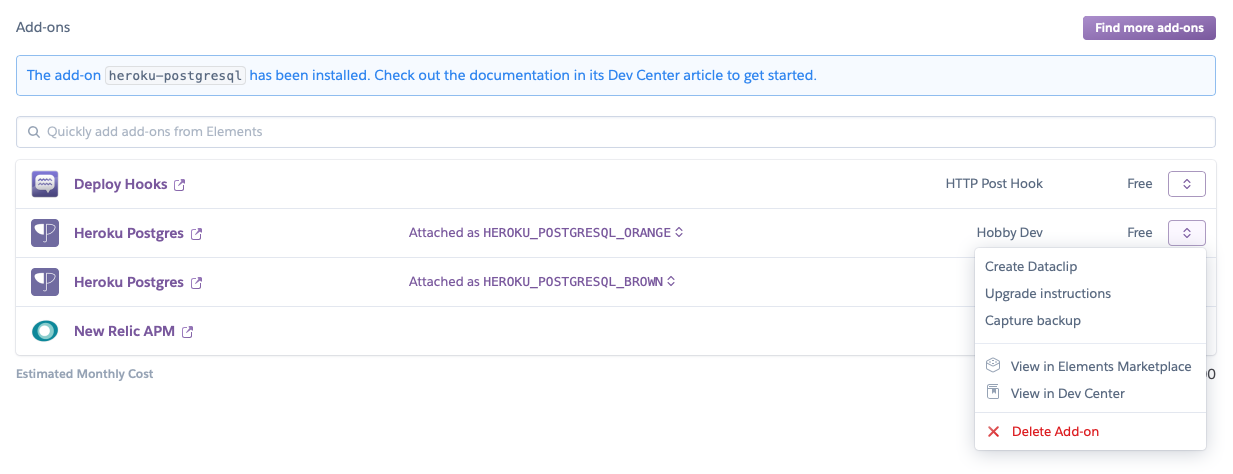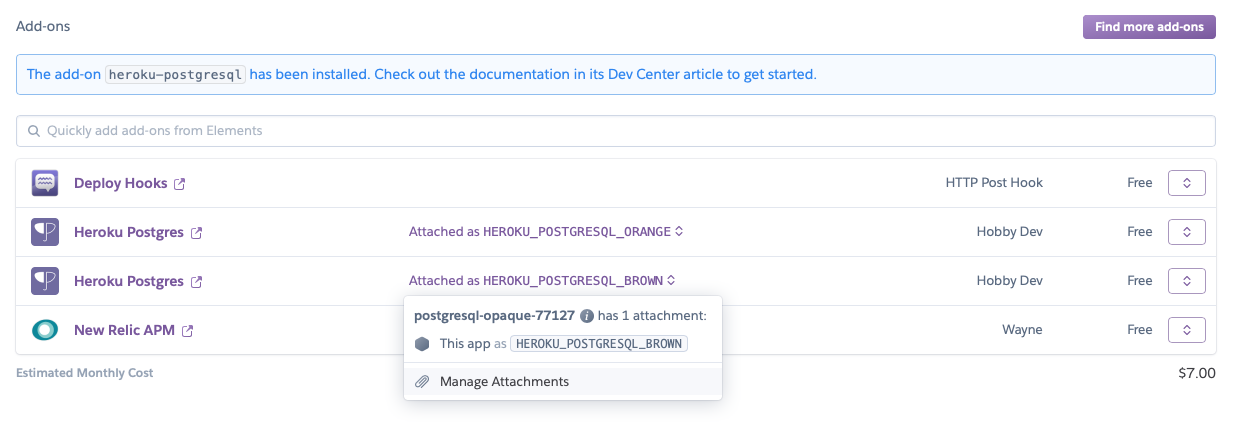Table of Contents [expand]
Last updated April 21, 2025
You can manage your add-ons either through the command line interface or through the Heroku Dashboard web interface.
Using the command line interface
You can view your current add-ons within an app with the heroku addons command.
$ heroku addons
newrelic:wayne
heroku-postgresql:essential-0
Creating an add-on
Previously to add an add-on you could use the command addons:add. That command is now deprecated in favor of the create command.
$ heroku addons:create newrelic:wayne
Adding newrelic:wayne on myapp...done, v27 (free)
Use `heroku addons:docs newrelic:wayne` to view documentation
You can specify the globally unique name using the --name flag. You can also specify the key your add-on is attached to using the --as flag.
Attaching an add-on to another app
You can attach certain add-ons to another app. When you attach an add-on it maintains a reference back to the original add-on provisioned on the initial app. The add-on must already exist on another app. In this case, the add-on’s fully qualified name is postgresql-rectangular-1234 and we are attaching it to an app named example-app. We also give it an alias of ATTACHED_DB using the --as flag:
$ heroku addons:attach postgresql-rectangular-1234 -a example-app --as ATTACHED_DB
Attaching postgresql-rectangular-1234 to example-app... done
Setting ATTACHED_DB vars and restarting example-app... done, v81
You can attach the same add-on to a maximum of 100 different apps.
Detaching an add-on from another app
You can also detach add-ons if you previously attached them to an app.
$ heroku addons:detach ATTACHED_DB -a example-app
Detaching ATTACHED_DB to example-app... done
Unsetting ATTACHED_DB config vars and restarting example-app... done, v82
Destroying an add-on
Previously to destroy an add-on you could use the command addons:remove. That command is now deprecated in favor of the destroy command.
$ heroku addons:destroy postgresql-rectangular-1234
Removing postgresql-rectangular-1234 from myapp...done, v27 ($5/month)
Upgrade an add-on
$ heroku addons:upgrade newrelic:hawke
Upgrading newrelic:hawke to myapp... done, v28 ($0.06/dyno/hr)
Use `heroku addons:docs newrelic:hawke` to view documentation
Downgrade an add-on
$ heroku addons:downgrade newrelic:wayne
Downgrading to newrelic:wayne on myapp... done, v27 (free)
Use `heroku addons:docs newrelic:wayne` to view documentation.
Open an add-on dashboard
$ heroku addons:open newrelic
Opening newrelic:hawke for myapp.
Using the dashboard
List add-ons
To see the add-ons provisioned and attached to an application, visit Heroku Dashboard and click on the name of the app or click the Resources tab when viewing an app.
Add an add-on
Visit the add-on catalog to find and install add-ons.
Remove, upgrade, or downgrade an add-on
Open the Heroku Dashboard. On the app’s Resources tab, scroll down to the Add-ons section. On the rightmost side of the add-on listing, click the actions button (three vertically-stacked dots) to open the menu. From this menu, you can remove, upgrade, or downgrade the add-on.

Additional add-on actions may be possible in this menu as well, such as the back-up functionality provided by Heroku Postgres:

Attaching an add-on to another app
If an add-on has implemented support for sharing across apps, you can attach that add-on to another app. This can be done in its attachments menu:

This can also be done through the command line interface by using the heroku addons:attach command.
Configure an add-on
Open the Heroku Dashboard. From the app’s Resources tab, find the add-on resource you want to configure and click on the name. This will take you to a configuration page that allows you to change the settings for the add-on.